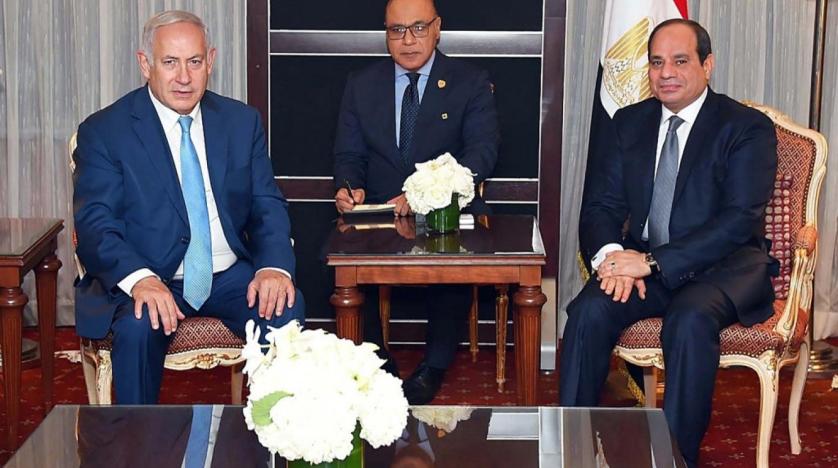Observers believe that Cairo will deal pragmatically with Netanyahu’s return in order to correct the government’s radical behavior towards the Palestinians
The ballot boxes had the last word in Israel and Binyamin Netanyahu came to power. Attention has shifted from wondering whether he will be victorious to the shape of his government and how he will deal with different issues, especially in neighboring countries. The right-leaning Prime Minister seems to be moving towards a more hardline form of government. This could affect his relations with Arab countries that have peaceful relations with Tel Aviv, particularly Egypt (which shares a long border with Israel and has traditionally mediated in frequent clashes between the Israeli army and Palestinian groups in the Gaza Strip).
Less than 18 months after leaving office, Netanyahu returned to the prime ministership through the same big gate he passed through after his camp won 65 seats in the Knesset. It is a comfortable majority that makes him competent to form a government and protects Israel from the dangers of governments with fragile majorities that have pushed Israel to five legislative elections in nearly three years.
Double radicalism
Described as one of Israel’s ‘hawks’, Netanyahu’s government is likely to be tougher than his previous governments, whether during his first term as prime minister (1996-1999) or his second (2009-2021). In fact, one of his two allies in the elections, Shas, won 11 seats, while Religious Zionism won 14 seats. According to the results published by the Israeli media, the Likud Party led by Netanyahu won 32 seats.
The most significant surprise in the results of last Tuesday’s elections in Israel was the rise of the Religious Zionism Party. It won 14 seats. That makes it the third largest party in the Knesset. This means that Itamar Ben Gvir, one of the party’s most prominent leaders, will be part of the next government. Itamar Ben Gvir is a member of the extremist Jewish Kach Movement, which has been declared a terrorist organization in Israel and the United States.
Ben Gvir has been accused eight times of involvement in acts of violence and incitement against Palestinians. The charges include inciting hatred and supporting terrorist organizations. As a lawyer, he devoted much of his work to defending settler cases. Ben Gvir defends the idea that Israel is a Jewish-Zionist state. He calls for the expulsion of ‘disloyal’ Arab citizens, referring to Israelis of Arab origin (Arabs of 1948), and rejects the creation of a Palestinian state.
“Fascist government”
Ayman er-Ragab, Palestinian Professor of Political Science, pointed out that the presence of this radical ideology within the Israeli government will make it an ‘extreme fascist’ government. “If Netanyahu fails to rein in the far-right members of his government with his political experience, it will affect the handling of different issues,” Ragab said.
Ragab said that Ben Gvir, who chants ‘death to Arabs’ in all forums and is the owner of the ideas of ‘rejection of the other’, will implement his plans to Judaize Jerusalem if he is appointed as a minister, Sharq al-Awsat reported, citing Independent Arabia. Ayman er-Ragab continued:
“He may attack the Palestinians or abandon them. He will put pressure on the Arab countries that have peace relations with Israel, especially Egypt and Jordan, which will of course reject these radical measures. This could strain the two countries’ relationship with Tel Aviv.”
The professor also pointed out that the pressure on Jordan would increase as it is the custodian of the holy sites in Jerusalem.
Sensing the danger
Ben Gvir announced before the elections that he would be willing to take over the internal security position if Netanyahu entered into negotiations with him to form a government.
On the other hand, Egyptian Foreign Minister Sameh Shukri discussed the results of the Israeli elections in a phone call with his US counterpart Antony Blinken last Thursday. According to a Foreign Ministry statement, Shoukry said it was important to “maintain calm in the Palestinian territories, avoid any escalatory or provocative measures against the Palestinian people, and intensify efforts to restart the peace process after the formation of the new Israeli government. In this context, Cairo expects the new Israeli government to be clear.
Ragab said that Cairo senses the danger from the radical right in its current form, is concerned about the stability of the situation in Palestine and is aware of the rise of extremism. “Egypt will play an important role in imposing a ceasefire and will not allow the Palestinians to leave the Israeli government,” he said.
Likewise, Hassan Abu Talib, advisor to the Al-Ahram Center for Strategic Studies, said that Israeli governments are pragmatically interested in Egypt with all its classifications. Abu Talib described Egypt as a partner in the Palestinian cause, despite Netanyahu’s efforts to “neutralize Egypt’s role in the issue or make it less important. According to Abu Talib, Netanyahu is also aware of what Cairo can do to prevent things from getting worse in Palestine, as has been repeated many times during the conflict with factions in Gaza.
Two-state solution
Speaking to Independent Arabia, Hassan Abu Talib said:
“Egypt’s relationship with the outcome of the elections is not direct, but is related to the policies and practices that the new government will undertake towards the Palestinians, whether in the West Bank and Gaza Strip or in the Palestinian territories of 1948.”
The most important change in these elections is the extreme radicalism that will characterize the new Israeli government, Abu Talib said, following the election campaigns and the candidates’ statements:
“The government can be expected to sign more settlements. This means more pressure on the Palestinian National Authority. At this point, Egypt should be wary of the Palestinian Authority’s expiration of its mandate and the two-state solution.”
Abu Talib stressed that despite all the comments on the performance of the Palestinian Authority, its continued existence “preserves the two-state solution,” while Netanyahu and all the radicals around him will seek to prevent and end the two-state solution. According to the advisor to the Al-Ahram Center for Strategic Studies, this takes the Palestinian cause back to before the Oslo Peace Accords of 1993. Noting that Netanyahu’s previous government called for Israel to become a ‘purely Jewish’ state and denied the rights of even Arabs with Israeli citizenship, Hassan Abu Talib said:
“He is expected to revive these calls and work to displace Palestinians, kill them and expand settlement operations. At this point, Arab countries, especially Egypt and Jordan, will deal with these practices. The more stringent Israel’s measures are, the more Cairo and Amman will have to work to preserve the two-state solution.”
Pragmatic approach
Abu Talib emphasized that Cairo will deal pragmatically with Netanyahu’s return to the government, which does not mean welcoming Netanyahu’s radicalism. On the contrary, according to Hassan Abu Talib, there are direct and indirect channels of dialogue with the Israeli government, including an attempt to engage the US side in dialogue in order to ‘repair’ the government’s radical behavior towards the Palestinians. While US President Joe Biden has spoken of his support for a two-state solution, Egypt will also play this role with European countries. Likewise, the advisor noted that there will be limits to Washington’s pressure on Israel, given that the US presidential elections are less than two years away.
Israeli Defense Minister Benny Gantz announced on August 22 that there is a crisis in Egyptian-Israeli relations due to the recent Gaza war, which ended earlier that month with an Egyptian-brokered ceasefire. “Egypt is an important regional player and one of Israel’s most important friends,” Gantz said. On the other hand, the visit to Cairo by Ronen Bar, the head of the Shin Bet, Israel’s security service, showed Tel Aviv’s desire to improve relations. Ronen Bar met with the head of Egypt’s General Intelligence Organization to monitor the ceasefire in Gaza and maintain calm.
Steps towards rapprochement
Egyptian-Israeli relations have witnessed several steps of rapprochement over the past two years, during former Prime Minister Naftali Bennett’s visit to Sharm Ash-Sheikh in September 2021. This was the first visit by an Israeli prime minister to Egypt since 2011, followed by another visit last March. In October 2021, the state-owned airline ‘EgyptAir’ made its first flight to Israel. This was described by the Israel Aviation Authority as a ‘historic step’.
Likewise, the security annex of the peace agreement was amended to allow Egypt to strengthen its military presence in the Rafah border area in the northern Sinai Peninsula by increasing the number and capabilities of border guards. This was announced at a meeting of the Egyptian-Israeli Joint Military Committee in November 2021. The Egyptian armed forces stated that the agreement is part of efforts to protect Egyptian national security, control and secure borders.





